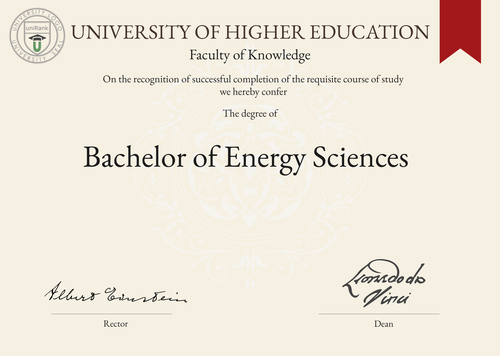
Bachelor of Energy Sciences (BES)
Guide to Bachelor of Energy Sciences Program/Course/Degree
Bachelor of Energy Sciences (BES)

Program Name:
Bachelor of Energy SciencesProgram or Degree abbreviation:
BESDuration range:
The duration of the Bachelor of Energy Sciences program typically ranges from 3 to 4 years.Tuition range:
The tuition fees for the Bachelor of Energy Sciences program can vary depending on the country and university chosen. It is recommended to check with specific institutions for accurate information.Overview:
The Bachelor of Energy Sciences program is designed to provide students with a comprehensive understanding of energy systems, renewable energy technologies, energy management and sustainable practices. Students will gain knowledge and skills to address the global energy challenges and contribute to the development of sustainable energy solutions.Curriculum Overview by year:
- Year 1: Introduction to Energy Sciences, Mathematics for Energy Sciences, Physics for Energy Sciences, Introduction to Renewable Energy - Year 2: Energy Conversion Technologies, Energy Storage Systems, Energy Policy and Economics, Sustainable Energy Systems - Year 3: Energy Management and Efficiency, Energy Distribution Systems, Environmental Impact of Energy Systems, Research Methods in Energy Sciences - Year 4: Advanced Energy Technologies, Energy Project Management, Energy Law and Regulations, Capstone ProjectKey Components:
The key components of the Bachelor of Energy Sciences program include studying energy systems, renewable energy technologies, energy management, energy policy and sustainable practices. Students will also gain practical skills through laboratory work, field visits and research projects.Career Prospects:
Graduates of the Bachelor of Energy Sciences program can pursue various career paths in the energy sector. They may work as energy consultants, renewable energy project managers, energy analysts, sustainability officers, energy auditors, or researchers in government agencies, energy companies, consulting firms, research institutions and non-profit organizations.Salary Expectations:
The salary expectations for graduates of the Bachelor of Energy Sciences program can vary depending on factors such as job position, location, industry and level of experience. Generally, professionals in the energy sector earn competitive salaries, with entry-level positions starting from $50,000 to $70,000 per year. For a more accurate understanding of salary expectations, you can utilize the Job Sites Search Engine, from our sister site jobRank, which searches over 4,600 job sites worldwide. Make sure to specify not only the job title but also the country you are interested in.Conclusions:
It is important to note that the duration, tuition fees, curriculum, key components, career prospects and salary expectations of the Bachelor of Energy Sciences program can vary depending on the country or location where the program is studied, as well as the chosen university. Prospective students are advised to research and compare different institutions to find the best fit for their academic and career goals. Visitors can search for where this specific degree, Bachelor of Energy Sciences, is offered anywhere in the world through the uniRank World Universities Search Engine.World Universities Search Engine
search for Bachelor of Energy Sciences (BES) and add the Location (country, state etc.) or specific University you are interested in studying at.
Query examples:
- Bachelor of Energy Sciences (BES) United States
- Bachelor of Energy Sciences (BES) United Kingdom online
- Bachelor of Energy Sciences (BES) Australia international students
- Bachelor of Energy Sciences (BES) University of California
- Bachelor of Energy Sciences (BES) University of London tuition fees
- Bachelor of Energy Sciences (BES) University of Sydney scholarships
Share Program/Course
Interesting? Share this program/course/degree info with your friends now.